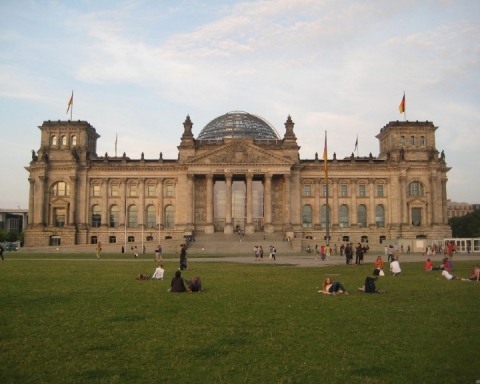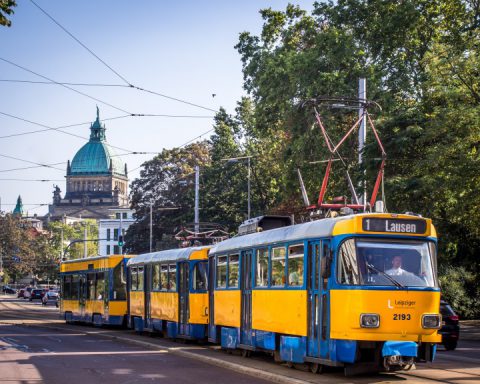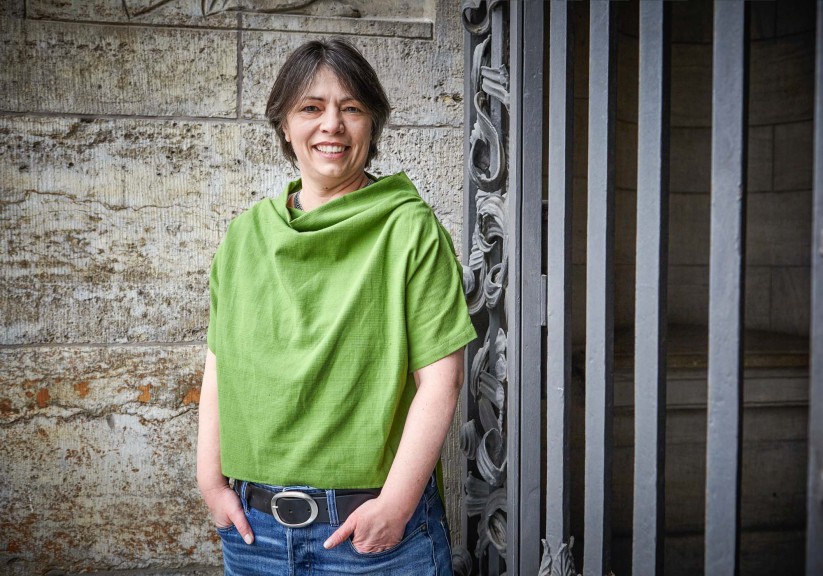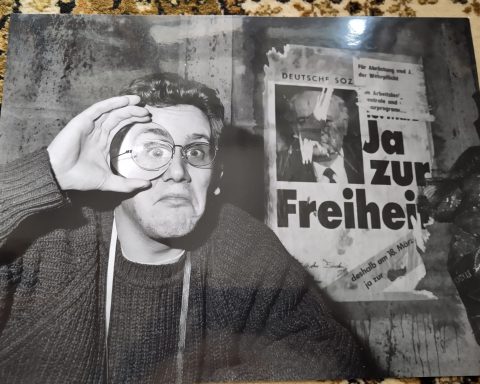Dr. Sabine Heymann (CDU) lives in Leipzig and is an incumbent candidate for City Council in Circuit 0, Leipzig Center. This interview with her is part of our series on the City Council and European Parliament elections of 26 May 2019. We invited all Leipzig candidates of all major parties (CDU, SPD, Grüne, Die Linke, FDP and AfD) to answer the questions below. Our aim is for our audience to get to meet the candidates and know their political stances better. All questions and answers are provided in German and English. The answers to the questions and any other opinions provided by them are the candidates’ own.
Dr. Sabine Heymann (CDU) lebt in Leipzig und ist amtierende Kandidatin für den Stadtrat im Wahlkreis 0, Leipzig Zentrum. Dieses Interview mit ihr ist Teil unserer Reihe über die Stadtrats- und Europawahlen am 26. Mai 2019. Wir haben alle Leipziger Kandidat_innen aller großen Parteien (CDU, SPD, Grüne, Die Linke, FDP und AfD) eingeladen, die folgenden Fragen zu beantworten. Unser Ziel ist, dass unser Publikum die Kandidat_innen und ihre politischen Standpunkte besser kennenlernt. Alle Fragen und Antworten zeigen wir in deutscher und englischer Sprache. Die Antworten auf die Fragen und alle anderen von ihnen ausgedrückten Meinungen sind allein die der Kandidaten.

Quelle/Source: Amt für Statistik und Wahlen Leipzig
Wenn man über lokale oder regionale Politik redet, schlafen viele Zuhörer ein… Lokale oder regionale Politik bzw. Wahlkämpfe sind für manche nicht so wichtig oder „sexy“ wie nationale Politik und Bundestagswahlen. Warum sollten sich Menschen für Politik auf lokaler oder regionaler Ebene interessieren? Warum ist diese Ebene der Politik Ihrer Meinung nach wichtig?
When one talks about local or regional politics, many listeners fall asleep… local or regional politics or election campaigns are for some not as important or “sexy” as national politics and federal elections. Why should people be interested in local or regional politics? Why do you consider this level of politics to be important?
Deutsch:Mir ist eher das Gegenteil bekannt. Die lokale Politik ist näher an den Menschen. Der Politiker muss fast alle seine Entscheidungen selbst mit ausbaden, d.h. er erlebt hautnah, was seine Entscheidungen bewirken. Wenn man bekannter ist als Stadtrat, dann darf man erleben, dass interessierte Bürger Ideen und Probleme direkt an einen herantragen. Auch wenn man dann immer mal wieder argumentieren muss, dass nicht alles auf kommunaler Ebene entschieden und beeinflusst werden kann, genießt man als ehrenamtlicher Stadtrat ein hohes Ansehen, weil man eben nicht „nur“ Politiker ist.
English: I’m rather aware of the contrary. Local politics is closer to the people. The politician is personally answerable for almost all of his decisions, that is, he closely experiences the effects of his decisions. When you’re known as a councilperson, then you may experience that interested citizens bring ideas and problems directly to you. Even if then you have to argue from time to time that not everything can be decided or influenced at the local level, you enjoy, as a volunteer city councilperson, a high reputation since you’re not “only” a politician.

Für viele junge Menschen ist Leipzig ein attraktiver Ort, um zu studieren oder um eine Ausbildung zu machen. Viele von ihnen finden danach aber keinen passenden Arbeitsplatz und müssen in andere Städte wie Berlin, München oder Hamburg ziehen. Das Bizarre dabei ist, dass Sachsen und Leipzig viel Geld ausgeben, um Arbeitskräfte auszubilden, die dann aber gar nicht in Sachsen, sondern in anderen Bundesländern arbeiten. Was kann man auf der Ebene der lokalen oder regionalen Politik machen, damit in Leipzig ausgebildete junge Leute hier eine langfristige Perspektive haben?
For many young people, Leipzig is an attractive place to study or do vocational training. However, many of them can’t find a suitable job afterwards and have to move to other cities such as Berlin, Munich or Hamburg. The bizarre thing is that Saxony and Leipzig spend a lot of money on training people who then work not in Saxony, but in other German regions. What can you do at the level of local or regional politics to give young people trained in Leipzig long-term prospects here?
Deutsch: Einerseits ist es normal, dass ein Hochschulstandort nicht allein nur für sich ausbildet. Andererseits ist es sicher wünschenswert, dass viele dieser jungen Menschen in Leipzig und in der Region bleiben. Insbesondere für die technischen Berufe wäre das in hohem Maße wünschenswert. Nun muss man allerdings sagen, dass gerade in Leipzig zahlreiche Stellen unbesetzt sind, von der Verwaltung über soziale Berufe bis hin zu den Ingenieurberufen. Auch gibt es ein spannendes Gründerklima. Die verschiedenen Formen von Coworking Spaces geben Raum, sich auszuprobieren.
Als Kommunalpolitiker stellen wir dazu sicher, dass nicht quartiersnahe Gewerbestandorte in hochpreisige Wohnungsstandorte umgewandelt werden, um sowohl Arbeit und Wohnen als auch Freizeit noch besser nahe beieinander organisieren zu können. Dies ist ein Lebensmodell, welches der modernen europäischen Stadt und den Ansprüchen einer ausgewogenen Work-Life-Balance gerecht wird.
Im Rahmen der interkommunalen Zusammenarbeit sichern wir auch weiterhin die Verfügbarkeit weiterer Gewerbeflächenstandorte im Umfeld von Leipzig. Auch beteiligt sich die Stadt Leipzig mit Beschluss des Stadtrates an diversen experimentellen Projekten, wie E-Mobilität und autonomes Fahren, die der Entwicklung von Kompetenzen Leipziger Unternehmen und der Entwicklung neuer Arbeitsplätze dienen.
Mit dem Vorhalten von Flächen auf der Alten Messe für Biotechnologie wird einer weiteren zukunftsweisenden Branche Raum gegeben. Allerdings gibt es den Mangel, dass im Durchschnitt aller Arbeitsplätze das Einkommen in Leipzig vergleichsweise gering ist, was aber nicht für den einzelnen Arbeitsplatz eines Hochschulabgängers gelten muss.
English: On one hand, it’s normal that a location of higher learning doesn’t train just for its own region. On the other hand, it’s certainly desirable that many of those young people remain in Leipzig and the region. Especially in technical professions, this would be highly desirable. We must say, however, that especially Leipzig has numerous vacancies in professions ranging from administration to social services to engineering. There’s also an exciting climate for startups. The different forms of co-working spaces provide room to try things.
As local politicians, we moreover ensure that commercial locations not close to living quarters are converted into high-price residential locations in order to bring work, living and leisure closer together even better. This is a model of life that matches the modern European city and the demands of a good work-life balance.
Within the framework of inter-municipal cooperation, we continue to ensure the availability of additional commercial spaces around Leipzig. The City of Leipzig, by decision of the City Council, also takes part in various experimental projects such as e-mobility and autonomous driving, which serve the development of competencies of Leipzig companies as well as the development of new jobs.
The provision of spaces at the Old Trade Fair for biotechnology will offer room to another forward-looking sector. However, there’s the problem that the average income in Leipzig, of all jobs combined, is comparatively low, which doesn’t necessarily apply, though, to the individual job of a university graduate.
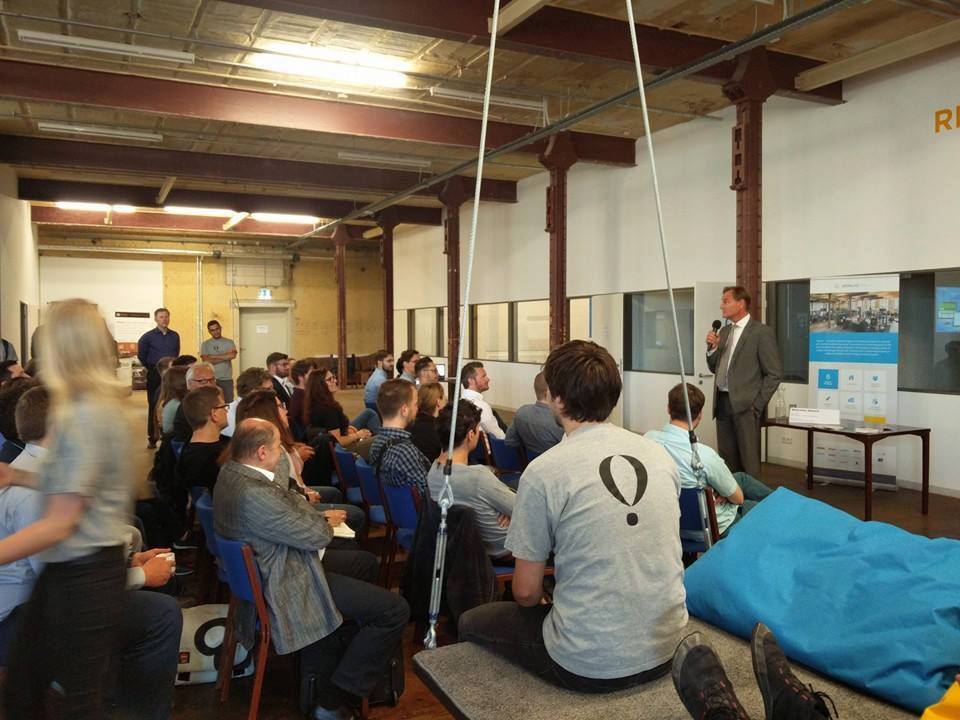
Für viele junge Familien ist es schwierig, in Leipzig zu bleiben, weil es relativ wenige Kitas gibt und die Mietpreise jedes Jahr steigen. Wie sollten diese Probleme Ihrer Meinung nach gelöst werden?
For many young families, it’s difficult to stay in Leipzig because there are relatively few day-care centers, and rental prices rise every year. How do you think these problems should be solved?
Deutsch: Es gehen jährlich weitere neue Kitas ans Netz, sodass wir zur Zeit immer weniger Klagen wegen Kita-Platzmangel verzeichnen müssen. Es steht zu hoffen, dass bald auch die Lage des Kita-Platzes für viele günstiger zu ihrem Wohn-/Arbeitsort ist.
Ein Thema ist natürlich die Mietpreisentwicklung. Es waren ja die günstigen Mieten und der Wohnungsleerstand verbunden mit vielen Experimentierräumen, die junge Familien nach Leipzig zogen. Doch wo kamen die überdurchschnittlich günstigen Mieten her? Eben aus dem überdurchschnittlichen Leerstand. Wir kommen nun in eine Situation, die für alle Wohneigentümer eine normalere wird, dass Mieten verlangt werden können, die sowohl die Sanierung von Wohnungen wirtschaftlich macht als auch den Neubau. Dabei spreche ich nicht von sog. Miethaien – ich spreche von den Genossenschaften, der kommunalen Wohnungsgesellschaft sowie den vielen kleinen Bestandshaltern.
In Altbauten kann man heute noch sehr moderate Mieten verzeichnen. Mit einer Durchschnittsmiete von ca. 6,50 €/qm und dem stärkeren Anstieg des Nettoeinkommens als der Mietentwicklung kann man grundsätzlich nicht von einer Notlage sprechen. Aber natürlich bekommt man günstige Wohnungen nicht in jedem Stadtteil.
Ein echtes Problem sind die Kosten einer Neubauwohnung und die Wohnnebenkosten. In Deutschland insgesamt und in Leipzig besonders sind durch steigende Boden- und Baupreise Miethöhen unter 10 €/qm kaum noch wirtschaftlich. Die Nebenkosten in Leipzig sind teilweise überdurchschnittlich hoch. Hier ist eine Baustelle, die wir als Stadträte mit unseren Einflussmöglichkeiten auf die kommunalen Unternehmen zu bearbeiten haben. Auch müssen wir dafür sorgen, dass das Bauen nicht durch überzogene Ansprüche an die Bauherren verteuert wird. Letztlich fehlen für viele junge Familien auch Möglichkeiten, sich durch Wohneigentum vor weiteren Mietentwicklungen zu schützen. Die fehlenden 5.000 Eigenheimstandorte sind ebenfalls ein Punkt, wo Stadtverwaltung und Stadtrat noch liefern müssen.
English: Every year, further daycare centers are added to the network, so that we now hear fewer complaints about a lack of daycare places. It’s to be hoped that, soon, the daycare places’ location will be closer to many people’s work and living places as well.
An issue is, of course, the development of rental prices. It was low rents and empty apartments combined with many spaces for experimenting that attracted young families to Leipzig. But where did the below-average rents come from? From above-average vacancies. We’re now reaching a situation that is becoming a more normal one for all homeowners, where rents can be demanded that make both the renovation of apartments and the construction of new ones profitable. I’m not referring here to so-called rental sharks, but to cooperatives, municipal housing companies, and the numerous small owners.
In old buildings, you can find very moderate rents still today. With an average rent of approximately €6.50 per square meter and a higher increase in net income than in rent prices, we basically can’t speak of an emergency. But of course, cheap apartments can’t be found in every quarter of the city.
A true problem is the cost of a newly built apartment and ancillary costs of housing. In Germany as a whole and in Leipzig in particular, the rise in land and construction costs means that rent levels below €10 per square meter are hardly economical. Ancillary costs in Leipzig are partly above average. This is something that we, as City Council members, have to work on with our opportunities of influence on municipal companies. We also have to ensure that construction is not made more expensive by exaggerated demands towards builders. After all, many young families lack the opportunities to protect themselves from further rental developments by becoming homeowners. The lack of 5,000 sites for privately owned homes is also an area where the City Administration and City Council still have to deliver.

Nach den Ereignissen in Chemnitz letztes Jahr ist der Ruf Sachsens vor allem in Bezug auf seine Weltoffenheit für viele Leipziger, Deutsche und Menschen in anderen Ländern schlechter geworden. Was werden Sie tun, um Sachsens Ruf in dieser Hinsicht zu verbessern?
After the events in Chemnitz last year, Saxony’s reputation has deteriorated for many Leipzigers, Germans and people in other countries, regarding especially its openness to the world. What will you do to improve Saxony’s reputation in this respect?
Deutsch: Weltoffenheit heißt jedem zuhören. Indem immer wieder Plattformen geschaffen werden, die es vielen ermöglichen, ihre Ideen und Probleme, ihre Hoffnungen und Ängste artikulieren zu dürfen, ohne in eine Schublade gesteckt zu werden, kann es uns gelingen, dass extremes Gedankengut sich nicht in der Mitte der Gesellschaft verankert. Es gilt, alltägliche Bilder zu zeigen, in denen die Normalität des Zusammenlebens verschiedener Nationalitäten, Religionen und Neigungen sichtbar wird. Dabei halte ich kaum etwas von apellatorischen Aktionen, wie Demonstrationen, und auch nichts davon, sog. Alltagsrassismus zu brandmarken. Das Bilanzieren guter Beispiele der Integration sollte maßgeblich sein und nicht allein die Bilanz extremistischer Ereignisse.
English: Cosmopolitanism means listening to everyone. By repeatedly creating platforms that allow many to express their ideas and problems, their hopes and fears without being pigeonholed, we can succeed in preventing extreme ideas from being anchored in society’s midst. We need to show everyday images in which the normalcy of the coexistence of different nationalities, religions and inclinations becomes visible. Here, I don’t think much of appellatory actions such as demonstrations or stigmatizing so‑called everyday racism. The list of good integration examples should be decisive, and not just the list of extremist events.
Viele Arbeitgeber in Leipzig hatten in den letzten Jahren Schwierigkeiten, qualifizierte Nicht-EU-Arbeitskräfte in Bereichen mit Arbeitskräftemangel zu beschäftigen, weil die Ausländerbehörde entweder Anträge zu langsam bearbeitet oder viel strenger ist als in anderen deutschen Städten. Was sollte die Politik hier Ihrer Meinung nach tun?
In recent years, many employers in Leipzig have had difficulties employing qualified non-EU workers in areas with labor shortages because the Foreigners’ Authority either processes applications too slowly or is much stricter than in other German cities. What do you think politicians should do about this?
Deutsch: Dieses Thema wird mit Recht immer wieder aufgerufen und ist Gegenstand zahlreicher Anfragen fast aller Fraktionen. In der Tat bewegen wir uns hier im Rahmen der Organisationshoheit des Oberbürgermeisters. Außer dem Beschluss von ausreichend Stellenzahlen für die Ausländerbehörde können wir hier nur mit Appellen agieren, dass die Struktur und Arbeitsweise den aktuellen Anforderungen angepasst wird. Diese Frage müsste also im kommenden Oberbürgermeisterwahlkampf nochmals gestellt werden.
English: This issue is rightly raised time and again, and is the subject of numerous inquiries from almost all political groups. In fact, we’re talking here about something under the organizational sovereignty of the head mayor. Apart from opting for a sufficient number of jobs within the Foreigners’ Authority, we can only act with appeals for the structure and work mode to be adapted to current requirements. This question must therefore be raised again in the upcoming electoral campaign for the office of head mayor.
Klimawandel trifft jeden Ort. Können Sie kurz erläutern, was Ihre Meinung zur aktuellen regionalen Klimapolitik ist?
Climate change affects every place. Can you briefly explain what your opinion is on current regional climate policy?
Deutsch: Sie ist mir nicht ausgewogen genug, da es eben keine regionale Klimapolititk gibt. Leipzig, genauer der OB, scheint der Meinung zu sein, dass Klimapolitik kommunal gemacht werden kann. Doch die Folgen einer Klimapolitik machen nicht an Stadtgrenzen halt. Hier erwarte ich eine regional überlegte Strategie, die sowohl Versorgungssicherheit (ohne weitere Belastung der Mietnebenkosten) als auch den Beitrag zum Klimaschutz im Blick hat. Aktionismus ist hier völlig fehl am Platz. Gerade die Leipziger Braunkohleregion hat den harten Ausstieg schon einmal erleben müssen. Aus diesen Erfahrungen sollte man lernen, um den Strukturwandel im tatsächlichen Sinne nachhaltig zu gestalten.
English: To me, it’s not balanced enough because there’s no such thing as regional climate policy. Leipzig, more precisely the head mayor, seems to think that climate policy can be made at the municipal level. But the consequences of a climate policy don’t stop at city borders. Here, I expect a regionally-reflected strategy that pays attention both to security of supply (without further burdening ancillary rental costs) and the contribution to climate protection. Impulsive action is completely out of place here. Especially the brown-coal region of Leipzig has already experienced a hard exit. One should learn from these experiences in order to really shape structural change in a sustainable way.

Wie sehen Sie Leipzig und Sachsen im Jahr 2040?
How do you see Leipzig in the year 2040?
Deutsch: Ich möchte mich hier auf Leipzig konzentrieren. Im Jahr 2040 ist Leipzig eine moderne europäische Stadt, die durch einen intelligenten Städtebau Wohnen, Arbeit und Freizeit in den Quartieren derart gut verknüpft, dass Verkehr kein Problemthema mehr ist. Mit autonom fahrenden Bussen und Straßenbahnen werden die Quartiere verbunden. Auch der ein oder andere Wasserweg dient als Verbindung zu anderen Kommunen, wie Halle a.S. Der Wirtschaftsraum im Norden Leipzigs ist immer mehr zusammengewachsen. Nicht nur Automobilindustrie und Logistik, sondern auch diverse weitere Branchen haben hier Raum gefunden. In der Markthalle auf dem Wilhelm-Leuschner-Platz erhält man hochwertige Produkte aus der Region. Durch einen regen Austausch mit der Region kam es zu einer Verbesserung der Mobilitität. Der zweite Citytunnel ist ans Netz gegangen. Wer günstig in Grimma wohnt, kann in Leipzig arbeiten und die Hochkultur nutzen.
Diese und weitere Potenziale sehe ich, wenn es gelingt, endlich strategischer und ohne Scheuklappen Stadtentwicklung zu betreiben.
English: Here, I would like to concentrate on Leipzig. In 2040, Leipzig is a modern European city that, through intelligent urban development, links living, work and leisure in its quarters so well that traffic is no longer a problematic issue. Neighborhoods are connected by autonomous buses and trams. One or the other waterway also serves as a connection to other municipalities such as Halle (Salle). The economic area in the North of Leipzig has grown together ever more. Not only car industry and logistics, but also various other sectors have found space here. In the market hall at Wilhelm Leuschner Platz, one gets high-quality products from the region. A lively exchange with the region has improved mobility. The second city tunnel has been added to the network. Those who cheaply live in Grimma can work in Leipzig and enjoy high culture.
I see these and other potentials if we succeed in finally pursuing urban development more strategically and without blinkers.

